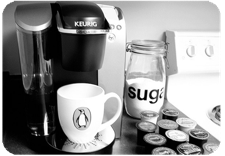Ownership of private property is one of the United States’ oldest economic principles. But like many other seemingly everlasting ideas, modern technology has enabled companies to put this concept to the test. For instance, a few years ago Keurig’s single-cup coffeemakers became a big hit with consumers. Rather than brew an entire pot of coffee, those in need of a jolt simply place a small pod of grounds into the machine and wait a few seconds for their drink to brew.
While the machines proved to be an immediate hit, customers weren’t as thrilled about the comparatively expensive coffee pods. Fortunately, plenty of other companies started to make their own pods as the machines grew in popularity. This wasn’t good news for Keurig, however, which wanted to keep drawing revenue from people’s machines even after they bought them. Researchers eventually arrived upon a novel solution that allowed the company to place microchips in all Keurig-made or licensed coffee pods. Once the pod is placed in the machine, a sensor scans its chip to make sure it’s official. If the customer puts in a third-party pod that isn’t related to Keurig, then the machine simply won’t brew it.
This form of digital rights management (DRM) solved the company’s first problem only to create an entirely new one once customers started complaining. After all, they purchased the machine and felt they had the right to use it as they pleased. Preventing customers from choosing their own pods left many with a poor impression of Keurig’s brand, leading to weaker sales and a sullied reputation. The company relented somewhat by introducing the “My K-cup,” a reusable filter that lets the owner put in the grounds of their choice. Keurig is sticking with the DRM model for its own pods, however, and it’s far from the only company to do so. John Deere is similarly testing the limits of ownership by claiming that their tractors are only “licensed” to customers due to the copyrighted computer software that now runs through most models. This controversial announcement angered many customers, potentially setting up John Deere for a backlash similar to what Keurig faced.
Questions:
- Why do companies insist that consumers use their replacement products?
- Will John Deere’s claim that consumers only license their tractors be upheld?
Source: Alex Hern, “Keurig Takes Steps Towards Abandoning Coffee-Pod DRM,” The Guardian, May 11, 2015; Kyle Weins, “We Can’t Let John Deere Destroy the Very Idea of Ownership,” Wired, April 21, 2015. Photo by: PJ in Omaha.

